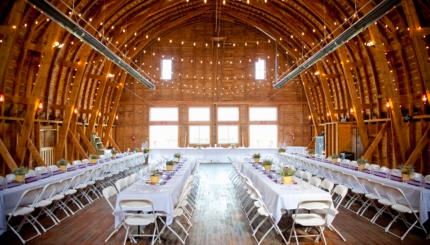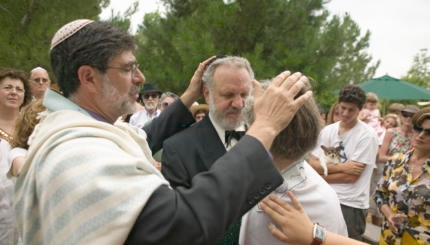Over the course of more than 18 years in the rabbinate, there has been one question that I was asked at every interview for any congregational rabbinic position – will I officiate at an interfaith wedding?
For the first 17 years of my rabbinate, I said no to officiating at interfaith ceremonies, for the same reasons that many of us said no, and it was pretty easy for me – it was black and white. I worked in synagogues that didn’t allow their rabbis to officiate at such events, and I didn’t need to ponder my decision much.
READ: Should Rabbis Say Yes to Officiating at Interfaith Weddings?
Until 18 months ago, when I founded a new model for Jewish community on Long Island, and I was no longer following any policy by any board. All of a sudden I needed to decide truly for myself – what makes the most sense for ME in today’s world. Our new community is all about being open and welcoming, lowering barriers and bringing people in. What kind of welcoming would I be doing it I was constantly saying no? And this was not just about officiation at wedding ceremonies. This was much bigger.
I thought long and hard about many of the synagogue policies that guided me over the prior 17 years. Would I be willing to work with a family who had a 6th grader interested in learning Hebrew and becoming a Bar or Bat Mitzvah, but who had no prior Hebrew school? Would I be willing to officiate under the chuppah in a Jewish wedding ceremony with a terrific bride and groom, one of whom happens to come from another faith? Am I willing to work with a couple to create a Jewish naming ceremony if another clergy would be in attendance? Would I be willing to officiate at B’nai Mitzvah services in a venue other than a synagogue sanctuary? Would I do a shivah service for a family who was not ‘part of my community’?
I quickly realized that the answers to all of these questions were no longer ‘no’. That does not always mean that I always say ‘yes’, but it does mean that I have a conversation with people, listen to their stories, try to understand their ‘why’, and then I make my deliberate and intentional decision.
I have learned to ask myself these important questions: Can I help them to move their Jewish journey along from one place to another? Can I provide them with guidance that might keep the door open to Judaism, Jewish learning and Jewish community? Will they possibly do ‘more Jewish’ because I shared this journey with them? Often I find that the answer to these questions, and to these individuals and families, is, in fact, ‘yes’.
READ: Finding a Rabbi or Cantor to Officiate at Your Interfaith Wedding
I realize now that if we keep saying no to so many Jews, potential Jews and Jewish families, then we will keep pushing people away from Judaism, instead of drawing them nearer. If you are a seeker, of Jewish community and/or Jewish ritual, in a typical or different way, keep looking for a clergy who will welcome you in. If you are a clergy person, strive to ask yourself the question – are my responses to the difficult questions helping me to fulfill my ultimate purpose in being a Jewish leader?
I have no regrets on the decisions I have made in the past, but I know that my current journey is what is best for me in this moment, at this time. Ki Va Moed: the time is now.



